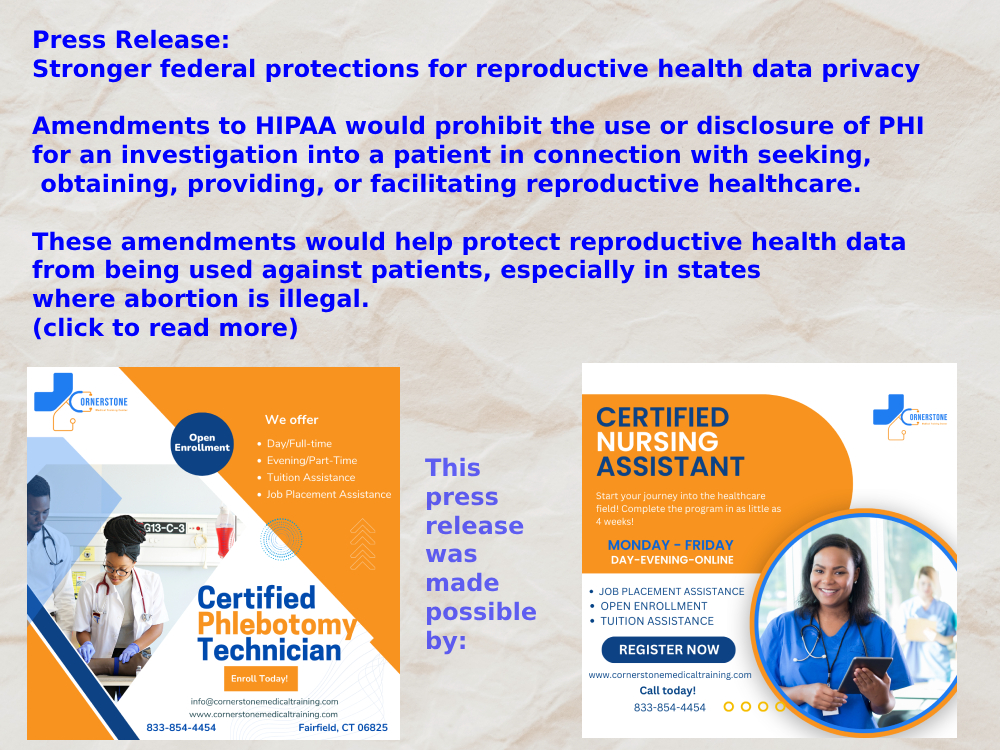(Hartford, CT) — Attorney General William Tong joined a coalition of 24 states supporting stronger protections for patients’ reproductive health information. The Biden Administration is considering adding amendments to the Health Insurance Portability and Accountability Act (HIPAA) Privacy Rule, the federal law that governs the disclosure of protected health information (PHI). If implemented, the changes would make it illegal to share a patient’s PHI if the PHI is being sought for certain criminal, civil, and administrative investigations and proceedings against a patient in connection with a legal abortion or other reproductive care. This is especially important as the U.S. Supreme Court decision overturning Roe v. Wade spurred many anti-abortion states to enforce draconian restrictions that could lead to criminal or civil penalties for anyone seeking, providing, or assisting with reproductive care. The coalition of attorneys general issued a letter welcoming the federal government’s proposed HIPAA amendments and adding that the additional guardrails would help safeguard reproductive health data from being wrongfully accessed and exploited to harm pregnant people or healthcare providers.
“Since the fall of Roe, extremist-led states have weaponized private health records to criminalize patients and doctors seeking and providing abortion care—including federally protected emergency treatment and care provided in states where abortion is legal. Connecticut’s Reproductive Freedom Defense Act was passed to respond to this threat, and I fully support the Biden Administration’s efforts to extend federal privacy protections to all seeking legal abortion and reproductive care,” said Attorney General Tong.
The decision in Dobbs v. Jackson Women’s Health Organization overturned Roe v. Wade in June 2022, and created a climate of uncertainty and fear among reproductive health care seekers and providers throughout the country. Fifteen states currently have laws in effect prohibiting abortion under all or most circumstances. Everyone involved in assisting, providing, and obtaining such care in those states may be at risk of investigation, civil liability, and criminal prosecution.
Attorney General Tong will host a forum on the anniversary of that decision at 10:30 a.m. on Thursday, June 22 at the Legislative Office Building. He will be joined by Counsels Nunley and Gait, as well as Lieutenant Governor Susan Bysiewicz, leaders from Planned Parenthood of Southern New England, Pro-Choice Connecticut, the American Civil Liberties Union of Connecticut, the Connecticut Women’s Education and Legal Fund, Reproductive Rights Caucus co-chairs Rep. Jillian Gilchrest and Rep. Matt Blumenthal, Sen. Mae Flexer, Sen. Heather Somers and others. See here for more information.
In the letter, the coalition of attorneys general welcomed the proposed HIPAA amendments, which aim to protect against such misuse and weaponization of people’s data. The amendments would prohibit the use or disclosure of PHI for an investigation into a patient in connection with seeking, obtaining, providing, or facilitating reproductive healthcare if:
• The patient seeking reproductive healthcare is in a state where such care is lawful; or
• The patient is seeking reproductive healthcare that is protected under federal law (for example, by the Emergency Medical Treatment & Labor Act), regardless of the state.
The coalition argues that these provisions are essential to begin creating a more unified privacy landscape for access to reproductive care, and urged the Biden Administration to adopt the provisions speedily. The attorneys general also called for the creation of a nationally available, online platform that provides accurate and clear information on reproductive care and privacy rights, and a public awareness campaign to promote the website.

